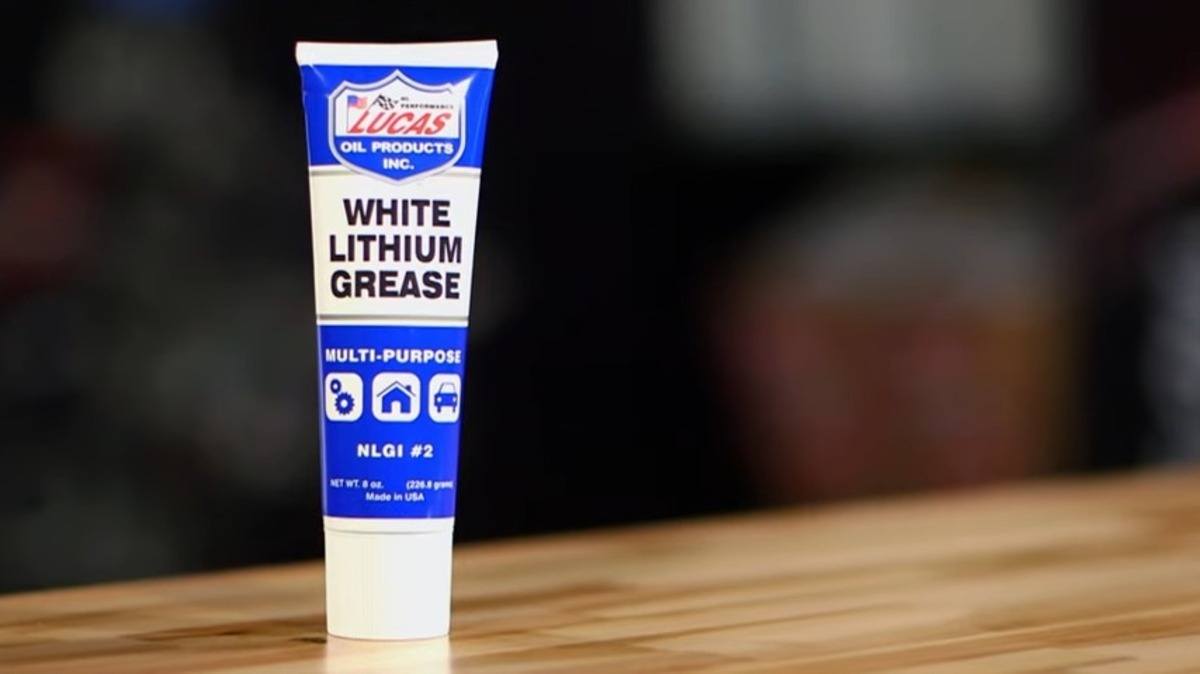Affiliate Disclosure: We may earn money or products from the companies mentioned in this post.
Maintaining a well-functioning garage door is essential for your home’s smooth operation and security. One key aspect of garage door maintenance is proper lubrication, which helps reduce friction, prevent wear and tear, and prolong the lifespan of various components. White lithium grease is often discussed when choosing the right lubricant due to its versatility and effectiveness.
This comprehensive guide will delve into using white lithium grease on garage doors. Whether you’re a seasoned DIY enthusiast or a curious homeowner, we aim to answer your burning questions and provide the information you need to make an informed decision.
Can You Use White Lithium Grease on Garage Door?
Yes, you can use white lithium grease on your garage door. White lithium grease is a versatile lubricant that can reduce friction, prevent rust and corrosion, and maintain the smooth operation of garage door components such as metal tracks, hinges, rollers, and springs. It provides long-lasting lubrication and helps extend the lifespan of your garage door.
You can use a spray or brush to apply white lithium grease. Ensure you cover the necessary areas, such as the tracks, hinges, and rollers, with a thin, even layer of grease. It is recommended to follow the manufacturer’s instructions for proper application and frequency of use.
Benefits of Using White Lithium Grease on Garage Doors
From reducing friction to preventing rust and corrosion, white lithium grease is a versatile lubricant that can greatly enhance the performance and longevity of your garage door.
1. Long-lasting Lubrication
One of the primary benefits of white lithium grease is its long-lasting lubricating properties. Unlike some other lubricants that may wear off quickly, white lithium grease adheres to the surfaces of garage door components and forms a protective film that resists friction and wear. This extended lubrication interval saves you time and effort in frequent reapplication.
2. Reduced Friction and Noise
White lithium grease reduces friction between moving parts of your garage door, such as metal tracks, hinges, and rollers. Providing a smooth and slippery surface, it minimizes the resistance encountered during the door’s operation.
As a result, you’ll notice a significant reduction in noise levels, allowing for a quieter opening and closing of your garage door.
3. Prevention of Rust and Corrosion
Garage doors are exposed to various environmental elements that can lead to rust and corrosion. White lithium grease acts as a protective barrier, inhibiting the formation of rust on metal components. This corrosion-resistant feature helps prolong the lifespan of your garage door, ensuring it remains in optimal condition for years to come.
4. Smooth and Reliable Operation
Applying white lithium grease to the moving parts of your garage door promotes smooth and reliable operation. The lubrication reduces the strain on the motor and other mechanical components, allowing them to work more efficiently. As a result, your garage door will experience less resistance, leading to smoother and more consistent performance.
5. Energy Efficiency
A well-lubricated garage door operates with less resistance, which can contribute to improved energy efficiency. When your garage door moves smoothly, it requires less force to open and close, reducing strain on the motor and consuming less energy. This can result in cost savings on your energy bills over time.
6. Extended Lifespan of Components
Regularly lubricating your garage door with white lithium grease can extend the lifespan of its various components. By reducing friction and minimizing wear, the lubricant helps prevent premature damage and the breakdown of hinges, rollers, tracks, and springs.
This saves you money on repairs and enhances your garage door system’s overall durability and longevity.
Application Methods for Using White Lithium Grease on Garage Door
Lubricating your garage door minimizes wear and tear, reduces noise, and extends the lifespan of its moving parts. Following the appropriate application techniques ensures that your garage door operates smoothly, quietly, and with minimal friction.
1. Spray Application
A spray can is convenient and efficient for applying white lithium grease. Here’s how to do it effectively:
- Prepare the area: Clean the garage door tracks, hinges, rollers, and springs to remove any dirt or debris.
- Shake the can: Vigorously shake the white lithium grease can to ensure proper lubricant mixing.
- Apply the grease: Hold the can approximately 6-8 inches away from the target area and spray a light, even coat of grease.
- Focus on critical points: Direct the spray towards the hinges, rollers, and pivot points to ensure thorough coverage.
- Wipe off excess: Use a clean cloth or rag to remove excess grease to prevent buildup and dripping.
2. Brush Application
Using a brush allows for more precise application and better control over the amount of grease used. Follow these steps for brush application:
- Select the appropriate brush: Choose a small brush with soft bristles to apply the grease effectively.
- Clean the components: Ensure the garage door parts are clean and free from dirt or debris.
- Dip the brush: Dip the brush into the white lithium grease, and coat the bristles evenly.
- Apply the grease: Brush the lubricant onto the hinges, rollers, tracks, and other moving parts. Apply a thin, even layer of grease.
- Work it in: Use the brush to work the grease into the components, ensuring thorough coverage.
- Remove excess: Wipe grease with a clean cloth or rag to prevent buildup.
3. Tube or Canister Application
Using a tube or canister with a nozzle allows for precise application in hard-to-reach areas. Follow these steps for tube or canister application:
- Clean the parts: Ensure the garage door components are clean and debris-free.
- Attach the nozzle: Attach the nozzle to the tube or canister, following the manufacturer’s instructions.
- Apply the grease: Squeeze a small amount of white lithium grease onto the desired area, such as hinges, pivot points, or rollers.
- Work it in: Use your fingers or a small brush to work the grease into the components, ensuring even coverage.
- Repeat as needed: Apply the grease to all relevant parts, repeating the process for complete lubrication.
Precautions for When Applying White Lithium Grease on Garage Door
By following these precautions, you’ll ensure a seamless and quiet door operation and prioritize your safety during the maintenance process.
1. Prepare and Protect
Before diving into the lubrication process, prepare and protect the surrounding area for a few moments. Here are a few key precautions:
- Ensure the garage door area is free of any objects, tools, or debris that could interfere with the lubrication process.
- Put on protective gloves and safety goggles to shield yourself from potential splatters or accidental contact with the grease.
- Lay down a drop cloth or newspaper to catch any drips or spills, preventing grease stains on your garage floor.
2. Clean and Inspect
To optimize the effectiveness of the lubrication and identify any potential issues, it’s crucial to clean and inspect the garage door components before applying white lithium grease:
- Remove dirt and debris: Use a soft cloth or brush to gently remove any accumulated dirt, dust, or debris from the metal tracks, hinges, rollers, and springs.
- Inspect for damage: Look closely at the components for signs of wear, damage, or misalignment. If you spot any significant issues, consult a repair professional before lubricating.
3. Use in Moderation
While white lithium grease is a fantastic lubricant, it’s important not to go overboard. Follow these precautions to ensure you’re using an appropriate amount:
- Avoid excessive application: Apply a thin, even coat of white lithium grease to the necessary areas. Excessive grease can attract dirt, dust, and debris, leading to potential blockages and performance issues.
- Focus on pivot points: Concentrate your lubrication efforts on the garage door mechanism’s hinges, rollers, and other pivot points. These areas typically experience the most friction and benefit from lubrication.
4. Wipe Off Excess Grease
Once you’ve applied the white lithium grease, it’s crucial to wipe off any excess to prevent potential problems:
- Use a clean cloth: Gently wipe away any visible excess grease on the garage door components. This step helps prevent the accumulation of dirt and dust, ensuring smooth operation.
- Pay attention to sensitive areas: When the grease could come into contact with garage door sensors, electronic connections, or rubber seals. Excess grease in these areas can interfere with their functionality.
5. Test and Observe
After applying white lithium grease, take a moment to test the garage door’s operation and observe any changes:
- Operate the door: Open and close the garage door a few times to distribute the lubricant evenly and assess the smoothness of its movement.
- Listen for noises: Listen carefully for any unusual sounds or squeaks that may indicate areas requiring additional lubrication or potential issues that need attention.
- Monitor performance: Monitor the garage door’s performance over the next few days. If you notice any unexpected changes or problems, it may be necessary to reassess the lubrication or seek professional assistance.
Are There Any Other Alternative Lubricants for Garage Doors?
While traditional options like white lithium grease, silicone, and Teflon-based lubricants are widely known and used, you may be curious if any other alternative lubricants are available.
1. Silicone-Based Lubricants
Silicone-based lubricants are a fantastic alternative to white lithium grease for garage doors. Here’s why:
- Silicone lubricants can withstand extreme temperatures, making them ideal for both hot summers and cold winters.
- Unlike other lubricants, silicone-based options won’t leave unsightly stains on your garage floor or door components.
- Water-Repellent Properties: Silicone lubricants create a protective barrier that helps repel water and prevent rust and corrosion.
- Superior Lubrication: They provide long-lasting lubrication, reducing friction and ensuring smooth door operation.
2. Teflon-Based Lubricants
Teflon-based lubricants are another fantastic alternative to consider. Check out their benefits:
- Teflon lubricants dry quickly, leaving behind a non-sticky, dry film that won’t attract dust or debris.
- Teflon’s low coefficient of friction helps minimize wear and tear on your garage door components, prolonging their lifespan.
- Resistant to Dirt and Grime: Teflon-based lubricants create a protective layer that resists the accumulation of dirt and grime, keeping your door running smoothly.
- Versatile Applications: These lubricants can be used on various materials, including metal, plastic, and rubber, making them suitable for different garage door components.
3. Graphite Lubricants
Graphite lubricants offer unique advantages when it comes to garage door maintenance:
- Dry Lubrication: Graphite lubricants are dry and powdered, so they won’t leave any residue or attract dust.
- Exceptional Anti-Friction Properties: Graphite reduces friction and helps minimize the noise and resistance often associated with garage door operation.
- Effective on Metal Components: Graphite lubricants provide an excellent solution for smooth movement if your garage door has metal-on-metal contact points, such as springs or hinges.
- Long-Lasting Performance: Graphite lubricants have good staying power, meaning less frequent reapplication than other lubricants.
Conclusion
We have discussed the various aspects and considerations surrounding using white lithium grease on garage doors. We explored its compatibility with materials commonly found in garage door mechanisms and highlighted its benefits for optimal door performance.
Additionally, we delved into the precautions you should take when applying white lithium grease to your garage door, emphasizing the importance of safety, proper preparation, and moderate application. By following these precautions, you can ensure a smoothly operating garage door and a safe and efficient maintenance process.
However, it’s worth noting that while white lithium grease is a widely used lubricant, it may not be the only option available. Alternative lubricants such as silicone-based, Teflon-based, graphite-based, and specialty lubricants designed for specific components offer unique properties and benefits that may better suit your specific needs. Exploring these alternatives can provide you with additional options to consider for your garage door maintenance routine.


